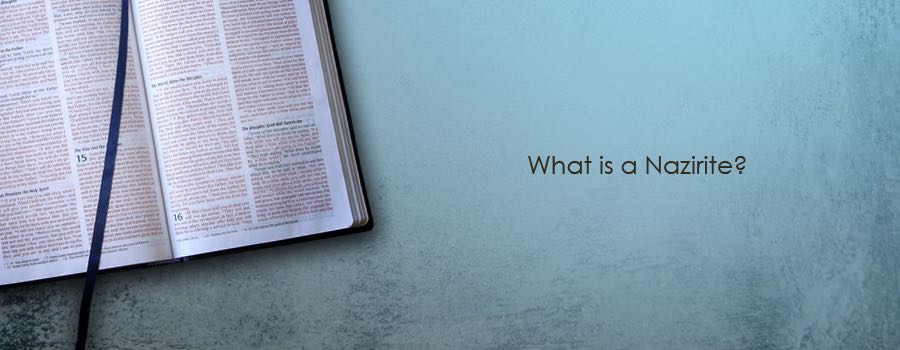This week’s Torah Portion includes the Nazirite vow. The Nazirite vow is a unique vow of separation unto the LORD for an undetermined amount of time. The instructions and details of the Nazirite vow are only found in this week’s Torah Portion, in Numbers chapter six:
Again the LORD spoke to Moses, saying, “Speak to the sons of Israel and say to them, ‘When a man or woman makes a special vow, the vow of a Nazirite, to dedicate himself to the LORD,… – Num. 6:1-2
In this introduction of the Nazirite vow, the LORD uses the word “special” to describe the Nazirite vow. Why is the Nazirite vow considered a “special vow?” What makes this vow “special?”
The Hebrew word used for “special” in Numbers 6:2 is the word “יפלא” – “yafli” which comes from the Hebrew root word “פלא” – “palah” and can mean great, difficult, wonderful, marvelous, hidden, or separate.
Watch the video teaching:
Is anything too Wonderful for the LORD?
The first use of the word “פלא” – “palah” in the Scriptures is found in the dialogue between Abraham and the LORD:
And the LORD said to Abraham, “Why did Sarah laugh, saying, ‘Shall I indeed bear a child, when I am so old?’ Is anything too difficult for the LORD? At the appointed time I will return to you, at this time next year, and Sarah will have a son.” – Gen. 18:13-14
When God confirmed the promise of a son to Sarah and Abraham, Sarah laughed to herself as she struggled to believe that such a thing could happen to them in their old age. The LORD responded to Sarah’s laughter with the question, Is anything too difficult for the LORD? which in Hebrew is “היפלא מיהוה דבר” – “ha’yipaleh me’Adonai davar” and is literally translated “Is anything too wonderful for the LORD?” The ability and power of the LORD is characterized by something great, by something separate, by something wonderful.

Wonderful Counselor
This Hebrew word “פלא” – “palah” is also used as a name of God. In the book of Isaiah we read about the Messiah who would come in the form of a child and would be called by various names:
For a child will be born to us, a son will be given to us; And the government will rest on His shoulders; And His name will be called Wonderful Counselor, Mighty God, Eternal Father, Prince of Peace. – Isaiah 9:6
Our finite minds struggle to understand an infinite God, however despite this limitation, God desires to make Himself known to us. In this descriptive list of the names of the Messiah is the name “Wonderful Counselor,” which in Hebrew is “פלא יועץ” – “pele yoetz.” The ways and counsel of God are awesome and amazing, therefore He is called “Wonderful Counselor.”
The Distinction of the Nazirite Vow
The more we see the word “פלא” – “palah” used in context, the more we understand that it describes something wonderful, something great, something set apart unto the LORD. The Nazirite vow was a means for a person to separate him or herself unto the LORD for a time and to draw closer to God in holiness: “All the days of his separation he is holy to the LORD.” (Num. 6:8) The Nazirite vow is special because it marks one as dedicated unto the LORD and anticipates wonderful things from the LORD.

The Nazirite Vow
The Nazirite vow is a special vow taken by either a man or a woman to dedicate him or herself to God for a certain time period. There are three main requirements for the one who takes this vow:
- To not drink wine or eat any fruit from the vine (grapes or raisins). The Nazirite is to abstain from all forms of alcohol and any product of the vine during his vow. – Num. 6:2-4
- To not cut the hair of one’s head – Num. 6:5
- To not touch a dead person. Num. 6:6-8
The person who takes the Nazirite vow must follow these three commands during the days of his or her separation unto the LORD.
Examples of the Nazirite in the Bible
The Bible only specifically mentions one person who was to live as a Nazirite, however there are a few other examples of those who took the Nazirite vow.
- Samuel the prophet is the first biblical example of a Nazirite. Samuel was dedicated to the LORD by his mother, Hannah. Hannah said that she would never shave his head, which is a sign of the Nazirite vow (1 Samuel 1:11).
- The only person that the Bible explicitly states was under the Nazirite vow was Samson. Samson was under the Nazarite vow from the womb, as declared by the angel of the LORD (1 Samuel 13:5).
- John the Baptist was dedicated from the womb and was commanded to never drink wine (Luke 1:13-15). This is a clear sign of the Nazirite vow.
- It appears that Paul the Apostle took the Nazirite vow for a time, along with four companions, when he was in Jerusalem (Acts 21:23-24).
The first three in this list were all Nazirites from birth, in fact, they were all miracle babies from mothers who were barren. The wonder of God was first displayed in the lives of the mothers as they embraced the joy of being a mother when all human means were expended.
Was Yeshua a Nazirite?
Many mistakenly believe that Yeshua was a Nazirite and this is why we almost always see Yeshua portrayed with long hair, a sign of the Nazirite vow. The Bible never states that Yeshua was a Nazirite, in fact, if He was a Nazirite we know that He broke at least two of the commandments; He drank wine and touched those who were dead, raising them to life (Luke 7:11-17, 33-34. 8:49-56). Yeshua was a Nazarite, meaning that He grew up in the city of Nazareth, however, there is no evidence that Yeshua was under the Nazirite vow.
Samson the Nazirite
The story of the birth of Samson is found in the book of Judges chapter 13. A man, who is identified as “the angel of the LORD,” appeared to a woman, who was barren, in the town of Zorah to inform her of the good news that a child would be born to her and her husband:
For behold, you shall conceive and give birth to a son, and no razor shall come upon his head, for the boy shall be a Nazirite to God from the womb; and he shall begin to deliver Israel from the hands of the Philistines. – Judges 13:5
Samson, was set apart from the womb. He would have no choice in his being a Nazirite.
When the angel of the LORD appeared to the woman He instructed her that she was not to drink wine or strong drink and that no razor was to come upon the head of the child because he would be a Nazirite from birth. He also instructed her not to eat anything unclean (Judges 13:2-5). The woman told her husband, who was named Manoach, and he then prayed to God and asked God to send the man again to receive further instruction about the child (Judges 13:8).
The LORD answered Manoach’s prayer and the angel of the LORD came to the woman again. The second time that the angel of the LORD appeared to the woman she ran to call Manoach and they both talked to the angel of the LORD. Manoach wanted more details but the angel of the LORD only reiterated that the woman should do as He has already instructed her; she was not to eat anything from the vine, nor drink wine or alcohol, and not to eat anything unclean (Judges 13:9-14).

Wonders in His Name
Manoach tried to detain the man and wanted to make a meal for him by cooking a goat. Manoach did not realize that He was the angel of the LORD (Judges 13:16). The angel of the LORD told Manoach that He would not eat of his food but that he may offer an offering up to the LORD. Manoach then asked the man a question:
Manoach said to the angel of the LORD, “What is your name, so that when your words come to pass, we may honor you?” But the angel of the LORD said to him, “Why do you ask my name, seeing it is wonderful?” – Judges 13:17-18
The angel of the LORD responded to Manoach by saying that His name is “wonderful” or possibly that His name is “special,” “hidden,” or “too wonderful to be spoken.” The Hebrew word for wonderful in this verse is the word “פלאי” – “feli,” which is from the Hebrew root word “פלא” – “palah” meaning special, wonderful, or marvelous. This is the same root word from Numbers 6:2.
Manoach did as the angel of the LORD instructed him and offered a goat on a rock together with a grain offering. The outcome was extraordinary:
So Manoach took the young goat with the grain offering and offered it on the rock to the LORD, and He performed wonders while Manoach and his wife looked on. For it came about when the flame went up from the altar toward heaven, that the angel of the LORD ascended in the flame of the altar. When Manoach and his wife saw this, they fell on their faces to the ground. – Num. 13:19-20
Something ordinary became something extraordinary when Manoach offered the goat as a sacrifice to the LORD: the angel of the LORD ascended to heaven by way of the flame of the sacrifice.
Wonderful in Name and Action
In this English translation we read regarding the angel of the LORD that, “He performed wonders while Manoach and his wife looked on” (Judges 13:19). This phrase “He performed wonders” in the Hebrew is “ומפלא לעשות” – “oo’mafli la’asot” and again we see the root word “פלא” – “palah,” meaning special, wonderful, marvelous. The angel of the LORD said that His name is “פלאי” – “feli,” and His actions of “מפלא” – “mafli” corresponded to His name “פלאי” – “feli.”
After the angel of the LORD ascended to heaven via the flame Manoach realized that he and his wife had just talked with God and he feared for their lives. Manoach’s wife calmed him down and reminded her husband that God would not give them this great news only to kill them. Manoach most have been relieved (Judges 13:22-23).
The words of the angel of the LORD came about just as He said. Samson was born and he was a Nazirite from birth (Judges 13:24-25). Samson didn’t choose to be a Nazirite but God chose this for him. He was set apart as God’s man to deliver the Israelites from the oppression of the Philistines. God did wonderful things through the life of Samson for His people Israel.

In the Bible we read of four examples of people who were under the Nazirite vow. Each person who is identified by the Nazirite vow in the Bible was used by God in a wondrous way: Samuel the Prophet, Samson the Judge, John the Baptist, and Paul the Apostle. Each one of them walked in the power of the Holy Spirit and the wonders of God were displayed in their lives in unique ways.
The Practice of the Nazirite Vow
The Nazirite vow is an excellent reminder to each one of us of the value of a dedicated life to the LORD. Each one of us have the opportunity to pull away from this world for a time (whether it be for a day, a week, or a month) to dedicate ourselves afresh to the LORD and to draw closer to His holiness.
I believe that the connection between the Nazirite vow and the Name of God, “פלא” – “pele” – “wonderful,” is to remind us that as we draw closer to His presence in holiness we are given the opportunity to taste and see His wonderful ways. This is why the Nazirite vow is called “יפלא” – “yafli” –“special” or “wonderful” (Num. 6:2).

Have you ever considered the practice of the Nazirite vow in our day? Many believers practice a lifestyle of fasting and prayer as a spiritual discipline and may abstain from certain foods or drinks during this time. I believe that this is a very similar practice to the Nazirite vow. Separation from the distractions of this world for a time of dedication unto the LORD is an invitation from the LORD Himself to draw closer to Him in holiness and experience the wonder of who He is. Is God calling you to a time of dedication to Him through the practice of the Nazirite vow?
Shabbat Shalom!
If you enjoyed reading this article, share it today with friends! We also invite you to sign up for our weekly Torah Portion commentary on the sidebar to the right.
Help keep our weekly commentaries free and available to all. Click here to donate today:
Torah Portion: Num. 4:21 – Num. 7:89
Hafatara: Judges 13:2-25
Return to Torah Portion Homepage
Copyright Jewels of Judaism. All rights reserved 2016



Thanks for the informative article. It’s good to see how the word ‘פלא’ to be used in various context and connected together.
Two months ago, I finished a forty-day fasting first time in my life. I don’t normally do it because I really like eating and cooking as you know and it was a big sacrifice to me. But after the fasting I wanted to do more. It was so wonderful to set apart a time just be with the Lord and pour out my heart to Him everyday. Since then I walk closer and closer to Him.
By the way, I have a question on Isaiah 9:6, it’s not related to this topic but want your opinion. I’ve had a conversation with a Jewish man who ran away from Judaism but still, as he claimed himself, believing in God. We talked about God becomes a man and I showed him Isaiah 9:6 (or 9:5 in Hebrew). He said it should be translated into “wonderful counsellor of the Mighty God, the Everlasting Father, The Prince of Peace.” What do you think?
Hey Nancy,
Thanks for the comments. A forty day fast, really? You’ll have to fill me in on more of what God showed you during this time.
Regarding the translation of Isaiah 9:6, I don’t really see why he would change the wording as he did. It doesn’t really make a difference either since the beginning of the verse says that “a child is born to us and a son is given to us” and then that “his named would be called Wonder Counselor, Prince of Peace, Mighty God.” It is fairly straightforward.
Blessings.
Daniel
Hi Daniel, well…that forty day fasting wasn’t a whole day fasting, only one meal a day, otherwise you might see me in the hospital. (But I’m considering to do another whole day fasting but in shorter period). You know, usually people start to do this because they want something eagerly. Me too. I was expecting that after the fasting, either see amazing thing happen and God answer my prayer, or nothing happen, give up and move on. But after the fasting, I felt that God wanted me to wait and continue to pray for that. And this is what I’m doing. But I would say, the benefit of fasting and praying is not that God answer my prayer or not. It’s about my relationship with God. I did get closer to Him, feel more intimate with Him, even feel in love with Him. I know that even at last He doesn’t give me what I’m asking for, He still loves me and I still love Him. This was the main outcome of the fasting.
For the Isaiah 9:6, that guy tried to deny that God would become man. For he said that Christian made man like God. So I asked him if it’s possible that God Himself become man? He said surely God can do anything He wants. But then he turned a little bit his point and said that but God will not do it. This is why I showed him the passage and he tried to explain that the child is not God, he is the counsellor of God. That’s it! It was actually a wonderful conversation. 🙂
Thanks for the clarification with the fasting and with the conversation with this person.
I understand what you’re saying now but still, there is no textual evidence in what he is proposing.
I would direct him to Genesis 18 where Adonai eats a meal with Abraham, they walk together, and talk together. When Adonai first appeared to Abraham, Abraham bowed in worship and called Him Adonai. Not Adoni, but Adonai! This is made clear by the vowel markers.
Blessings,
Daniel
Thanks, this is a good suggestion. 🙂